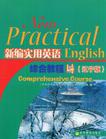新编实用英语综合教程
2008-12
高等教育出版社
贾方,《新编实用英语》(辽宁版)教材编写组 编
204
《新编实用英语》(辽宁版)是在“普通高等教育‘十一五’国家级规划教材”《新编实用英语》(第二版)的基础上,由辽宁省高职高专院校具有丰富教学经验的一线教师结合辽宁省对外交流实际改编而成的一套高职高专英语地方版教材。 《新编实用英语》(辽宁版)共有4册,每册由《综合教程》、《扩展教程》、《教师参考书》和《学习指导》以及配套的多媒体学习课件、电子教案、录音带等组成。 《新编实用英语4》(辽宁版)主教材每册8个单元,每单元由“说”(TalkingFacetoFace)、“听”(BeingA11Eai‘s)、“读”(MaintainingaShatpEye)、“写”(TryingYourHand)、“考试备考”(PreparingforTest)以及“趣味阅读”(HavingSomeFun)6部分组成。具体内容如下: 1.TalkingFacetoFace:包括2个紧扣交际主题的对话样例,供学生学习模仿,并配有5个短小的交际话题模拟练习。此外,每单元都有1个具有辽宁地方特色、配有图片和问题的讨论话题,其目的是通过各种形式的口头练习活动,使学生了解辽宁,热爱辽宁,并在讨论活动中提高口语交际能力。 2.BeingAIlEars:本部分是对TalkingFacetoFace的扩大与补充,以体现“听力训练的范围要广于说的训练”的原则,并为阅读作铺垫。 3.MaintainingaSharpEye:本教程打破先教课文、后进行语言训练的传统模式,把阅读作为外语教学训练的归结,并通过阅读开拓眼界,进一步提高语感和交际能力,为学生自主学习创造充分的条件。 4.TryingYourHand:写作部分为应用文写作(AppliedWriting)和一般写作(GeneralWriting)两部分。前者培养学生阅读和模拟套写《高职高专教育英语课程教学基本要求(试行)》规定的常用应用文的能力;后者则按句子写作、功能写作和篇章写作等层次进行训练。 5.PreparingforTest:每单元详细介绍一种考试题型(部分题型取自大学英语四级考试),并配有相应的练习。其目的是帮助学生熟悉和了解“高等学校英语应用能力考试(笔试)”A级考试以及“大学英语四级考试”的相关题型,做好应试准备。 6.HavingSomeFun:每课选配一个精悍的幽默小故事,培养学生学习、体味与欣赏英语和英语文化能力。 《新编实用英语一综合教程4》由原教育部高职高专教育英语课程教学指导委员会主任委员、大连理工大学孔庆炎教授和高等学校英语应用能力考试委员会主任委员、上海交通大学刘鸿章教授任总主编。广东警官学院向前进、王雨梅教授任主编,湖北师范学院李桂芳教授、佛山科学技术学院李辉睦教授任副主编,周迎芳、徐伟成、向波阳等人参加编写。 《编实用英语》(辽宁版)仍由孔庆炎、刘鸿章任总主编,沈阳工程学院刘然教授任副总主编。《新编实用英语一综合教程4》(辽宁版)由辽宁装备制造职业技术学院贾方任主编;辽宁科技大学高等职业技术学院刘歌红、渤海船舶职业技术学院付洪彩、辽宁省交通高等专科学校韩杰任副主编。沈阳航空工业学院江沈英、邓彦东、李琳琳、刘敬玉任编者。 本书在编写期间得到了辽宁省教育厅各级领导和辽宁省高职高专院校主管教学校长们的多方指导和帮助,在此一并表示衷心的感谢! 由于本书是一种新的尝试,会有不当和疏漏之处,希望广大使用者批评指正,以使本教程能为辽宁省高职高专英语教学做出更大的贡献。
《新编实用英语》系列教材是由教育部高职高专教育英语课程教学指导委员会根据《高职高专教育英语课程教学基本要求(试行)》组织编写的。《新编实用英语》(辽宁版)系列教材是在“普通高等教育‘十一五’国家级规划教材”《新编实用英语》第二版的基础上改编而成。本套教材认真贯彻了“学一点、会一点、用一点”、“听、说、读、写、译并重”和“边学边用、学用结合”的原则,注重听说技能训练,注重对实用文体阅读能力的培养,将应用语言基本功的能力与实际涉外交际能力相结合。 本套教材还注重“教、学、考”相互照应。学完第2册可参加“高等学校英语应用能力考试”的B级考试,学完第四册可参加A级考试。 《新编实用英语:综合教程4(辽宁版)》为《综合教程》(辽宁版)第4册,共8个单元,每个单元都由“说”、“听”、“读”、“写”、“考试备考”和“趣味阅读”6部分组成。《新编实用英语:综合教程4(辽宁版)》为4色印刷,版式精美,并配有录音带。
1 EnglishStudies and TestsSection Ⅰ Talking Face to FaceSection Ⅱ Being All EarsSection Ⅲ Maintaining aSharp EyePassage Ⅰ Same Language, Different MeaningsPassage Ⅱ Guess Whos Not Coming to Dinner?Section Ⅳ Trying Your HandSection Ⅴ Preparing for TestSection Ⅵ HavingSome Fun2 Art of NegotiationsSection Ⅰ Talking Face to FaceSection Ⅱ BeingAll EarsSection Ⅲ Maintaining aSharp EyePassage Ⅰ Art of NegotiationsPassage Ⅱ Watch That FirstStepSection Ⅳ Trying Your HandSection Ⅴ Preparing for TestSection Ⅵ HavingSome Fun3 DNA and CloningSection Ⅰ Talking Face to FaceSection Ⅱ Being All EarsSection Ⅲ Maintaining aSharp EyePassage Ⅰ To Clone or Not to ClonePassage Ⅱ Should We Fear Dolly?Section Ⅳ Trying Your HandSection Ⅴ Preparing for TestSection Ⅵ HavingSome Fun4 The IT AgeSection Ⅰ Talking Face to FaceSection Ⅱ BeingAll EarsSection Ⅲ Maintaining aSharp EyePassage Ⅰ Reach Out and TOUCHSomeone OnlinePassage Ⅱ Buzzword: GlobalizationSection Ⅳ Trying Your HandSection Ⅴ Preparing for TestSection Ⅵ HavingSome Fun5 Studying OverseasSection Ⅰ Talking Face to FaceSection Ⅱ Being All EarsSection Ⅲ Maintaining aSharp EyePassage Ⅰ Return to Home Country:A Thirty-Year Perspective from NigeriaPassage Ⅱ ReturnScholar-Run Businesses Promote Hi-TechSection Ⅳ Trying Your HandSection Ⅴ Preparing for TestSection Ⅵ HavingSome Fun6 Art in EngineeringSection Ⅰ Talking Face to FaceSection Ⅱ Being All EarsSection Ⅲ Maintaining aSharp EyePassage Ⅰ Waht Rhymes with Engineers?Passage Ⅱ Right or Wrong?Section Ⅳ Trying Your HandSection Ⅴ Preparing for TestSection Ⅵ HavingSome Fun7 EnvironmentSection Ⅰ Talking Face to FaceSection Ⅱ BeingAll EarsSection Ⅲ Maintaining aSharp EyePassage Ⅰ Shrinking WaterSupply Poses Threat to PeacePassage Ⅱ Save the PlanktonSection Ⅳ Trying Your HandSection Ⅴ Preparing for TestSection Ⅵ HavingSome Fun8 Cultural Differences and Business ManagementSection Ⅰ Talking Face to FaceSection Ⅱ Being All EarsSection Ⅲ Maintaining aSharp EyePassage Ⅰ Cultural Differences and Doing Business in Europe and JapanPassage Ⅱ Dont Cry for New EconomySection Ⅳ Trying Your HandSection Ⅴ Preparing for TestSection Ⅵ HavingSome FunNEW WORDS AND EXPRESSIONSVOCABULARYPHRASES
With apologies to Shakespeare, the question of the day seems related to cloning. "Hamlet" posed the issue strongly in terms of what it means to be as a human being. The moral question begins in the meanings associated with being human. Whether to clone people or not to clone them is a question pertaining to our being human. Science is constantly producing spectacular feats. But somewhere among the most amaz- ing has to be that of cloning a mammal from an adult. "Dolly" is a sheep exactly like the 6 year- old sheep (Lets call her "Molly" because twins often have names that rhyme and it helps to tell them apart), from whom a cell was used to develop the cloned cell that became Dolly. Needless to say, such spectacular scientific "breakthroughs" usually generate enormous controversy. Wide-eyed enthusiasts welcomed Dollys birth and health with visions of how won- derful the future will be in the fight against disease among both animals and people. But critics were not to be outdone —— they imagined a future in which clones would populate the earth and human uniqueness would virtually disappear. Some more modestly reserved judgment until the nature of the experiment became clearer. The very idea of cloning raises a number of questions just from a technical point of view. First, are the "twins" really identical? Well have to wait and see about Dolly, but scientists do not know the answers to some very interesting questions. For instance, has the age of the cell and thus of the offspring been altered? Or is Dolly really the same age as the ewe from whom she was cloned? Will Dolly show signs of aging prematurely? What a dilemma. If she is to be truly identical, she would have to be the same age, would she not? But if she is really only a few months old, what happened to the genetic clock that was set with Molly? The more serious moral questions are related to the meaning of cloning for people. Will someone attempt to clone a human being? People are insatiably curious and seem determined to mine every nook of nature. Where the frontiers of knowledge are concerned, no law is ad- equate to stop the urge to find out. Curiosity and the desire to know will win out over whatever pressures there are against such ventures. The most serious objection to cloning a human being focuses on the impact it would have on the developing persons. Would the clone be thought of simply as "a clone"? Would he or she be depersonalized, deprived of any possibility ever of developing their own unique sense of identity and personhood? Would a clone of Michael Jordan, Bill Gates or Bill Clinton be just like them?
